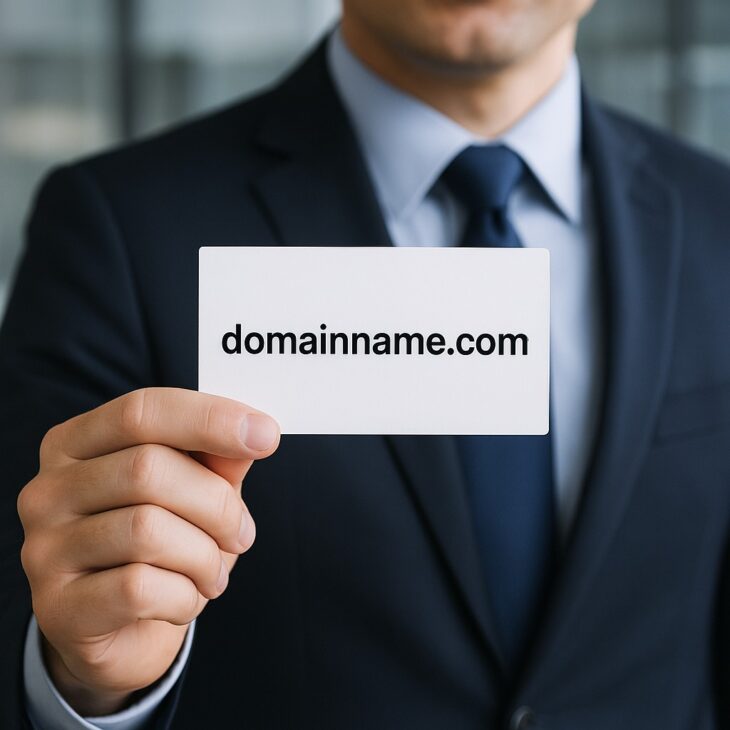In a world where digital presence drives business growth, first impressions begin with a click.
A domain name serves as the digital front door, greeting potential customers before any product, pitch, or service comes into view.
Choosing wisely can define brand perception, improve discoverability, and enhance long-term credibility.
Table of Contents
ToggleThe Role of a Domain Name in Business Success

A domain name acts as the digital home base where every online interaction begins. It functions like the address on a storefront; one glance, and people form an impression.
That impression shapes trust, credibility, and customer curiosity.
First contact often happens at the domain level. Before any interaction with a product or service, the domain frames the user’s mindset. A name that’s long, cluttered, or overly complicated may signal inexperience or disorganization.
On the other hand, a domain that’s short, professional, and aligned with the business inspires confidence.
Domain names create lasting impressions, especially when compared side-by-side:
- www.acadia.inc feels refined, structured, and business-ready.
- www.acadia.pun raises questions, reduces confidence, and creates friction.
A domain functions as more than a signpost – it supports every customer touchpoint:
- Appears in every email signature
- Shared in social media bios and marketing materials
- Included in pitches, invoices, and ads
- Searched and typed directly by potential clients
Every one of those touchpoints either boosts trust or weakens it. A strong domain puts businesses in control of that perception, setting a tone before the first click.
Why “Clean” Matters in Domain Naming

Simplicity translates to recall. Clean domains get stuck in people’s heads – on purpose. No clutter, no confusion.
Clunky names slow users down. Every added hyphen, number, or obscure reference forces a mental detour. Attention spans don’t last long, and errors increase with every unnecessary character.
Here’s what makes a domain clean and user-friendly:
- No hyphens or underscores
- No numbers unless essential to brand identity
- Easy to spell, pronounce, and remember
- Short enough to avoid abbreviation or misspelling
Clarity increases direct traffic. When people can recall the name without checking a note or doing a second search, they return faster and more often.
A clean domain also leads to:
- Fewer support emails about misspellings or broken links
- Higher rates of word-of-mouth referrals
- Increased brand loyalty through consistent presentation
Confusion sends traffic elsewhere, sometimes to competitors with better-structured names. Clean domains defend against that risk and solidify digital presence.
Domain Extensions: More Than Just .com

Domain extensions serve more than a technical function – they influence perception, trust, and relevance. A top-level domain (TLD) follows the name and plays a direct role in how a website feels at first glance.
Most users still default to .com. It’s embedded in user habits, taught by years of repetition, and viewed as the standard.
However, other extensions now offer more targeted, strategic options for businesses looking to define themselves more precisely in a competitive space.
Some of the most used and strategically valuable extensions include:
- .com – Widely adopted, universal, seen as reliable and safe
- .inc – Strong signal of business formality, ideal for companies, firms, and enterprises
- .ai – Tied to artificial intelligence, innovation, and startup culture
- .store – Immediately suggests e-commerce, retail, or online sales
- .design – Best for agencies, branding professionals, and visual-focused services
These options allow businesses to make a statement. The extension itself becomes part of the brand, sometimes replacing the need for extra words in the domain name.
A firm selling templates could use templates.design rather than adding the word “design” elsewhere.
Audience perception hinges on familiarity. A user encountering a .com domain has no learning curve.
But a .xyz or .club might prompt second-guessing, especially if it doesn’t match the content or context.
Several key factors influence the effectiveness of an extension:
- Industry expectations – Professional services often lean toward .com or .inc, while tech or creative fields experiment more freely
- Typing habits and errors – Users accustomed to .com may instinctively add it, leading to traffic leakage
- Brand tone consistency – A playful brand may embrace a fun TLD, while a formal company requires structure and trust
Choosing a domain extension is more than filling space; it reflects intent, trustworthiness, and relevance. Users place subconscious weight on what follows the dot.
A misaligned extension can disrupt confidence before the page even loads.
For businesses already using a domain but looking to improve control or consolidate brand assets, a domain transfer offer provides an easy way to upgrade without starting from scratch.
Why “Memorable” Matters
In a space crowded with options, repetition wins. People remember what feels familiar, easy to repeat, and contextually relevant.
Memorable names aren’t just catchy, they fit the brand’s voice.
They appear naturally in conversation, stay in the mind after a first visit, and reduce reliance on bookmarks or saved links.
Being memorable strengthens branding. Customers don’t just remember the name, they remember the business behind it. That association becomes part of decision-making.
What makes a domain memorable:
- Short, no more than 2–3 words
- Phonetically simple
- Closely tied to the product, industry, or mission
- Free from jargon or overused generic terms
Brand recall increases when a domain name carries weight:
- Person hears the name in a podcast and types it later without error
- Friend recommends the brand verbally, and the domain is easy to search
- Visitor leaves the site but returns days later without needing a prompt
Memorability creates momentum – digital word-of-mouth at its most effective.
SEO and Keyword Benefits
Search engines look for signals. Domains provide them with early clues about what to expect.
A domain with relevant keywords can signal relevance and improve rank for specific search queries.
Keyword stuffing damages credibility. Instead, balance matters. A good domain reflects brand identity while hinting at business focus.
Examples of effective balance:
- bestshoes.com leans toward direct search optimization
- barefootstyle.com offers branding with a keyword twist
Search engines reward domains that:
- Align with user intent
- Contain terms related to products or services
- Match expectations when users click
Domains also affect anchor text, backlink quality, and trust ratings. A keyword-aligned domain, when used properly, boosts:
- Organic search performance
- Click-through rates on branded and non-branded queries
- Consistency in link building campaigns
Domain names support broader content strategies and strengthen every part of the digital funnel.
Final Thoughts
A well-chosen domain delivers measurable benefits. It builds brand equity, increases discoverability, reduces customer confusion, and improves long-term marketing efficiency.
Early investment secures digital territory before someone else claims it. A premium often costs more but returns value in traffic, conversions, and brand strength over time.
Waiting risks losing the perfect name to a competitor or speculator. Smart companies secure their names early, then build around them with confidence.
Every business should act now, secure their domain, and begin shaping their identity where it matters most: online.

